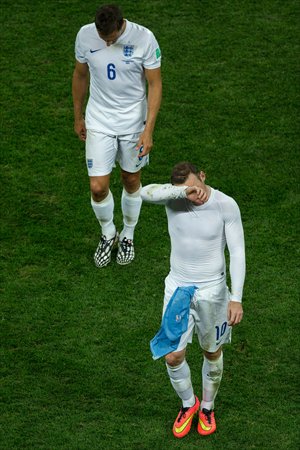HOME >> SPORTS
First round leaves Europe all at sea
Source:AFP-Global Times Published: 2014-6-27 21:48:01
Latin American teams create sensation at Brazil tournament

Wayne Rooney (No.10) and Phil Jagielka of England leave the field after losing to Uruguay in a Group D match at the World Cup in Sao Paulo on June 19. Photo: IC

Italy's Andrea Pirlo (No.21) competes for the ball with Uruguay's Edinson Cavani during a Group D match at the World Cup in Natal on Tuesday. Photo: AFP
Cristiano Ronaldo, Wayne Rooney, Andrea Pirlo and Xavi have left Brazil with their tails between their legs highlighting the hard times for Europe at the World Cup.Having provided seven of the last eight World Cup semifinalists, Europe's dominance appears to be on the wane after a brutal group phase for the continent's teams.
Where Latin American sides such as Chile and Costa Rica created a sensation, Europe's powerhouses flopped, with Italy, England, Portugal and defending champions Spain among seven teams from the UEFA zone eliminated in the first round.
European superstars disappointed. In sharp contrast, World Cup crowds have thrilled to the virtuoso performances of Neymar and Lionel Messi, the swashbuckling soccer of Chile and Colombia, and the daring displays of giant-killing Costa Rica.
While France, the Netherlands, Germany, Belgium, Switzerland and Greece remain in contention for glory, the tournament has done little to encourage hope of a first European World Cup success in the Americas.
"It cannot be a coincidence that a European team couldn't win a World Cup held in South America," declared Switzerland's decorated German coach Ottmar Hitzfeld before the tournament.
"Not in Uruguay, not in Mexico, not in Argentina, and for sure not in Brazil."
Europe's World Cup difficulties may be part of an emerging trend.
Whereas European teams filled 10 of the last 16 places in five of the first six tournaments after the round was introduced in 1986 (with nine getting there in 2002), only six made it in 2010 and this year.
Home advantage
With tens of thousands of fans from neighboring countries flooding into Brazil, the South American teams have clearly benefited from home advantage.
Supporters from Argentina and Chile took over Rio de Janeiro's Maracana when their sides played there in the group phase. France coach Didier Deschamps believes such mass support can make a difference.
"We are in Brazil, so the South American teams certainly acclimatize better, and maybe the fact that they are playing so close to home and have so many supporters with them gives them added strength and energy," Deschamps said Wednesday.
Developing Deschamps' theme, Brazil striker Fred said, "I think the climate can make a bit of a difference, because we are better adapted to it.
"The tactical aspect makes a difference, too. We see Colombia, Ecuador, Uruguay, Chile all playing technically good football. And as they are used to the very hot climate, it can end up helping a bit."
Better preparations
England manager Roy Hodgson feels that European sides are hindered by the strengths of their domestic championships.
Citing the examples of Group D winners Costa Rica and Iran, who almost held Argentina to a goalless draw in Group F, he said that it is easier for the tournament's supposed weaker sides to gather together for pre-competition training camps, making them more well-drilled and tactically flexible.
"Iran and Costa Rica have been together for months, so they've really had a chance to do the type of work that we've been happy to do for three or four weeks with our players," Hodgson said after his side's group-phase exit.
"We'll never get the access to our players that Iran or Costa Rica get."
One consolation for the Europeans is that only one of Brazil, Chile, Colombia and Uruguay can reach the semifinals due to the configuration of the draw.
And although only six teams from Europe reached the last 16 in 2010, three of those went on to reach the semifinals, while the final between Spain and the Netherlands was the second all-European affair in a row after the final between France and Italy in 2006. France, Germany and the Netherlands are again looking strong and confident.
While it has been a chastening first fortnight for the old continent, the cream of European soccer can still rise to the top.
Posted in: Soccer